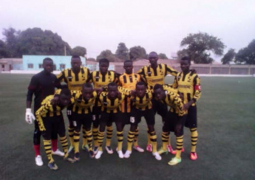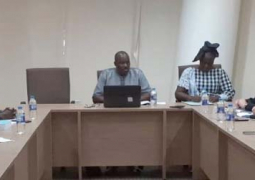Njogu Bah is already serving a two-year jail term after being convicted by the Special Criminal Court in Banjul.
Testifying under cross-examination, the first prosecution witness (PW1), Lamin Ceesay, told the court that he did not know Ms Jainaba Jobarteh during the course of their investigation.
Asked by defence counsel LK Mboge whether he had checked or looked into the file of Jainaba Jobarteh at the Personnel Management Office (PMO) during the course of their investigation, the witness answered in the negative.
Counsel then put it to him that how did he know that the appointment of Jainaba Jobarteh was not proper, but the Director of Public Prosecutions, S.H. Burkun, raised objection that the witness had never mentioned the appointment of Jainaba Jobarteh was not proper.
When Counsel LK Mboge further asked the witness whether he had finished his investigation relating to matter, the witness answered in the affirmative.
Told how could he concluded his investigation without checking or looking into the file of Jainaba Jobarteh as a subject matter, the witness replied that he did not know.
Asked by counsel whether he could produce the witness’s statement of Dawda Fadera, the permanent secretary at the Personnel Management Office, but the witness said it should be in the file.
At that juncture, defence counsel applied to the court for the witness to produce the witness statement of Dawda Fadera, permanent secretary at the PMO.
However, the DPP raised objection telling the court that the defence knew how to apply under the Evidence Act for the notice to be produced, after the notice was served to the relevant parties then the court could consider.
DPP argued that if the defence asked this particular witness to produce the document, the witness did not have the power to do so, if there was any.
He said the Evidence Act was very clear when the application was made for the production of a particular document because the state priority is needed to be considered before such document be made available to the court.
In response, defence counsel LK Mboge told the court that it was the duty of the state and the defence together to give evidence to the court for the progress of the case.
“I made an application for the witnesses’ statement to be copied to the defence, and the statement of Dawda Fadera was not copied to the defence for the best reason known to the prosecution,” he said.
He added that this is a court of summary jurisdiction and the section cited by DPP under the Evidence Act does not apply, while citing the Evidence Act.
He said the only grounds that the prosecution could object the production of document is when there is public interest.
He also said the witness told the court that the document was in the file, and even where the prosecution objecting on the grounds ofpublic interest, the court shall determine whether the document shall be produced or not.
The case was adjourned till 7 April 2014, for ruling.
Read Other Articles In Article (Archive)




